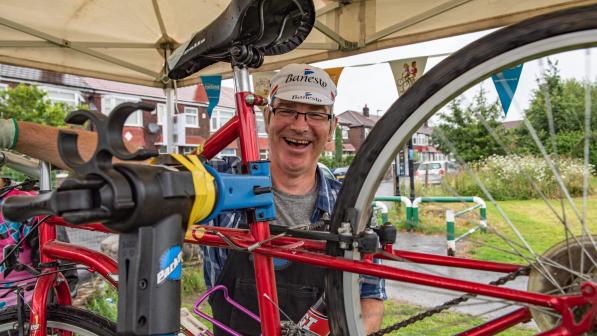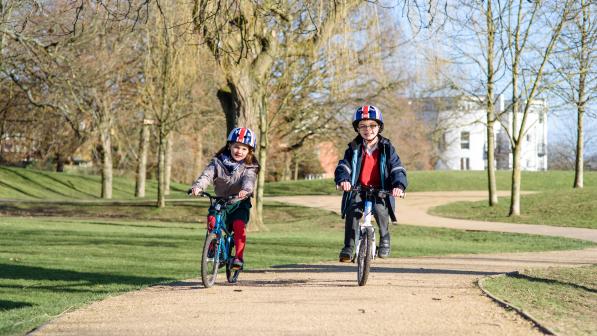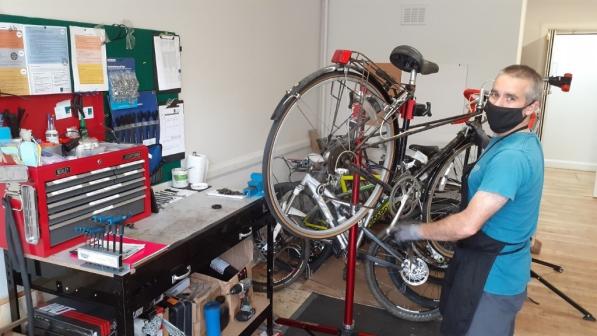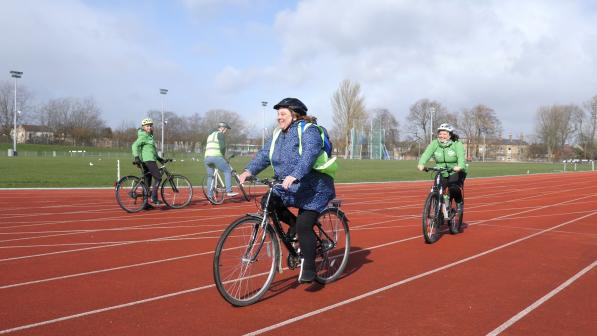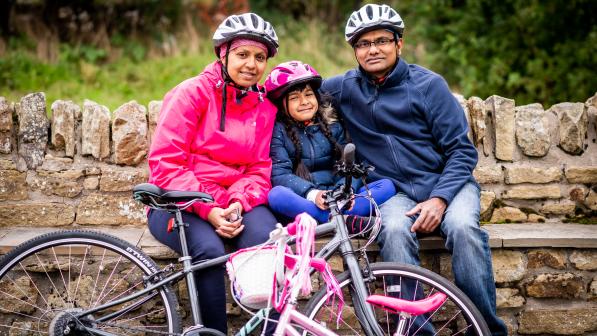Putting the 'big' in The Big Bike Revival

As any proud parent will tell you, watching your child learn to cycle is a memorable experience. I should know, my daughter is three and we’ve got her a balance bike. Although she isn’t quite there yet, she’s almost got the hang of it. Seeing the smile on her face as she scoots along is the best feeling in the world.
Some children are a little bit older before they are first introduced to cycling, but whatever age they are, it's important to remember that learning to ride is about having fun as well as developing a skill for life.
Last week, Cycling UK took a big step forward in supporting more children in England to be able to cycle, with the announcement of the extension of our flagship Big Bike Revival programme into schools.
The Department for Transport has awarded £1-million to the programme to work with the Bikeability Trust and other partners to set up cycle repair workshops in primary schools and local neighbourhoods, to make sure pupils have bicycles which are fit for the road.
Much like those children pedalling under their own steam for the first time, it's an exciting moment for everyone who has been involved with Cycling UK’s behaviour change work; at the risk of stretching the analogy too far, the stabilisers are off and we feel like we're really flying.
How the Big Bike Revival has gone from a £1-milion to a £3-million project
Last year, Cycling UK was awarded £1m by DfT to deliver the Big Bike Revival in England. This year, with the addition of the £1m to support Bikeability work in schools, the programme’s total budget will have tripled.
The 2020 programme has already adapted; helping more than 7,800 key workers to continue to cycle to work, easing pressure on public transport during the global pandemic, and has begun offering pop-up Dr Bike sessions where upwards of 2,500 bikes have been fixed in communities and workplaces across the England.
The essence of The Big Bike Revival is very much the same as it was when it was first piloted five years ago, but the way in which it is administered has changed. It's now a very big project to manage and it has grown exponentially over the years.
Different scale…same programme
The changes this year are, in part, a response to the challenges of coronavirus. With so much uncertainty in our lives; how and when we return to work, or what leisure activities remain low-risk in terms of managing infection rates, it’s no wonder government are looking to use methods which are tried and tested.
The Big Bike Revival is demonstrable in getting more people cycling, and the data proves it; more than 1,000 extra cycle journeys a week were made in the UK in 2019 thanks to The Big Bike Revival. What is more, the programme engages with people who are not always reached by the message of the benefits of cycling; 46% of participants are non-regular cyclists, 49% are female and 30% are of non-white ethnicity.
The theory which underpins The Big Bike Revival, is scientifically grounded. We use the COM-B model of behaviour change which considers a person’s capability, opportunity, motivation, and how they impact on one’s behaviour. Fixing a bike addresses some of the physical barriers to opportunities to cycle, such as ability to afford a bicycle, or to repair one that is broken. These barriers affect young people every bit as much as adults. We also need to tackle psychological factors which may be inhibiting someone’s wish to cycle.
Creating 'sticky' habits
A recent academic study into the effect of pop-up bike lanes on cycling in European cities, found that an average pop-up bike lane program led to a 7% increase in city-wide cycling. Of course, you don’t need to be a scientist to see that there is a correlation between better infrastructure being introduced, and more people choosing to cycle. Our recent article on 'six reasons to build bike lanes' also pointed out examples here in the UK where new lanes encouraged more people to cycle.
However, the study also concluded, if you want this behaviour to become permanent, you can’t just rely on infrastructure to make people behave differently, you need to make people think differently about having the ability to go for a ride, For a habit to become ‘sticky’ we need to deploy behavioural science, which underpins the Big Bike Revival.
The Big Bike Revival goes to school
Parts of the country are crying out for cycle training, and there is a big backlog of Bikeability skills delivery because schools were closed to all but the children of key workers for several months during the summer.
Bikeability instructors mainly deliver training through school visits, and those instructors may spend the whole of the first day in a school checking bikes are safe and doing minor repairs before the children even get to sit on a saddle. The pop-up Dr Bike facility will enable this to be done efficiently, meaning Bikeability instructors can get straight into teaching how to ride on local roads and simple junctions.
The latest phase of delivery will also be targeted at working in communities and tackling backlogs in rural areas or other locations that may have been underserved in the past.
The essence of the Big Bike Revival is very much the same as it was when it was first piloted five years ago but...it has grown exponentially over the years
James Scott, director of behaviour change and development, Cycling UK
The additional £1m funding covers work in England, and aims to support the fixing of 10,000 children’s bikes across the country.
In Scotland this year, The Big Bike Revival for Key Workers has helped keep key workers pedalling – or get them pedalling if they didn’t already have access to a working bike. Thanks to funding from Transport Scotland, thousands of key workers have benefited from free bike safety checks and repairs, bike and equipment loans and accessories like helmets and locks.
The rise in family cycling during lockdown has been heartening, but we don’t want to miss children out, and we want to build on the efforts of many families by supporting cycle training in schools, and dovetailing our work with that of Bikeability allows both partners to deliver what they know best.
